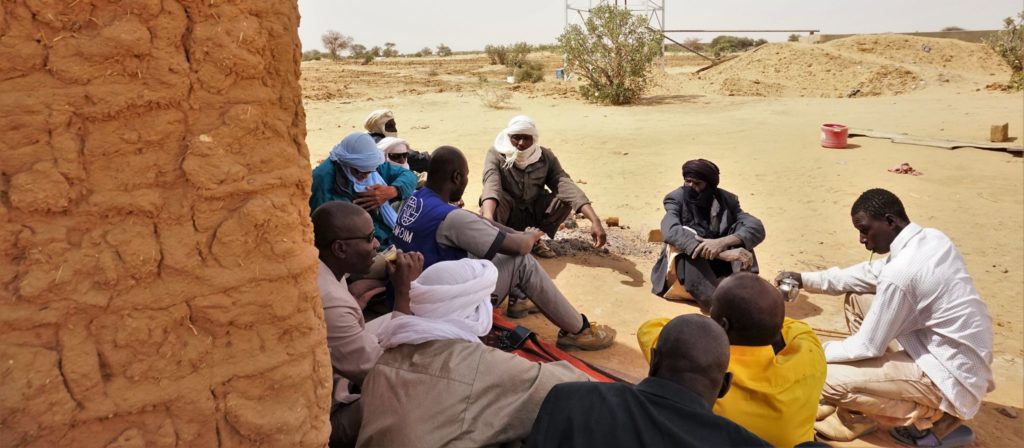The United Nations Convention to Combat Desertification (UNCCD) has been accepted as an UNICC Partner Organization.
UNCCD’s mandate issues from its Global Mechanism (GM), established under Article 21 of the United Nations Convention to Combat Desertification (UNCCD), to assist countries in the mobilization of financial resources to implement the Convention and address desertification, land degradation and drought. As an operational arm of the Convention, the GM provides advisory services and works together with developing countries, private sector and donors to mobilize substantial resources for the implementation of UNCCD.
According to the UN and World Bank, 40 percent of the global population is affected by water scarcity, and by 2030, up to 700 million people could be displaced as a result.Some recent news from UNCCD and its leader, Executive Secreary Ibrahim Thiaw of Mauritania, can be viewed here: https://news.globallandscapesforum.org/36264/ibrahim-thiaw-desertified-lands/.
UNCCD (with FAO, UNFCCC and many others), contributes to the well-known Greet Green Wall of Africa. It’s just one example of the seartingly important work that they are doing across the world.
What is the Great Green Wall?
The Great Green Wall is a symbol of hope in the face of one of the biggest challenges of our time – desertification. Launched in 2007 by the African Union, this game-changing African-led initiative aims to restore Africa’s degraded landscapes and transform millions of lives in one of the world’s poorest regions, the Sahel. Once complete, the Wall will be the largest living structure on the planet – an 8,000 km natural wonder of the world stretching across the entire width of the continent.
The Great Green Wall is now being implemented in more than 20 countries across Africa and more than eight billion dollars have been mobilized and pledged for its support. The initiative brings together African countries and international partners, under the leadership of the African Union Commission and Pan-African Agency of the Great Green Wall.
Objectives
By 2030, the ambition of the initiative is to restore 100 million hectares of currently degraded land; sequester 250 million tons of carbon and create 10 million green jobs. This will support communities living along the Wall to:
- Grow fertile land, one of humanity’s most precious natural assets
- Grow economic opportunities for the world’s youngest population
- Grow food security for the millions that go hungry every day
- Grow climate resilience in a region where temperatures are rising faster than anywhere else on Earth
- Grow a wonder of the world spanning 8000 km across Africa.
Key results
Since its launch in 2007, major progress has been made in restoring the fertility of Sahelian lands. Key examples include:
- Ethiopia: 15 million hectares of degraded land restored, land tenure security improved
- Senegal: 11.4 million trees planted, 25 000 hectares of degraded land restored
- Nigeria: 5 million hectares of degraded land restored and 20 000 jobs created
- Sudan: 2,000 hectares of land restored
- Burkina Faso, Mali, Niger: about 120 communities involved, a green belt created over more than 2,500 hectares of degraded and drylands, more than two million seeds and seedlings planted from fifty native species of trees.
How is the UNCCD supporting the initiative?
FLEUVE Project – The Local Environmental Coalition for a Green Union (2014–2018)
The Global Mechanism (GM) of the UNCCD implemented a flagship initiative under the Great Green Wall called FLEUVE. The project was financed by the European Commission in the amount of about seven million Euro and was implemented from 2014-19.
FLEUVE aimed at strengthening the capacities of local communities to help boost investments in land restoration and created employment opportunities or ‘green jobs. The project was driven by local people themselves to strengthen community resilience to land degradation, drought and climate variability.
Micro-investment projects were implemented under FLEUVE in 23 communities across five Sahel countries – Burkina Faso, Chad, Mali, Niger and Senegal. The project was complemented by regional-level activities on capacity building and the dissemination of good practices on sustainable land management and innovative financing.
The Global Mechanism of the UNCCD is also supporting the development of sustainable value chains, where it is working with the private sector who guarantee purchase of dryland products in the Sahel. This leads to the creation of land-based jobs for thousands of rural women in the Sahel.

